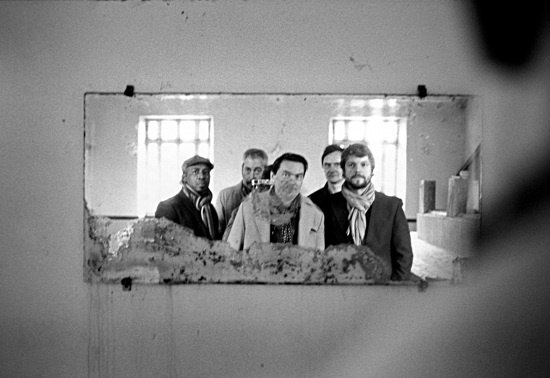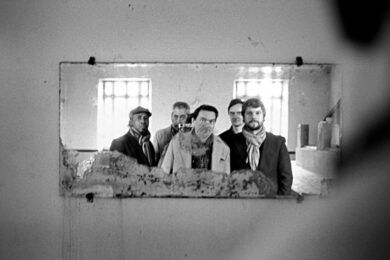I’ve mislaid the exact quotation, but I’m pretty sure that somewhere, probably in one of his letters to fellow novelist George Sand, Gustave Flaubert said that the one thing that frustrated his meticulous capacity for avoiding cliché was love. In love, I believe he said, we’re all trapped within the extant stock of metaphor, reduced to a condition of bêtise – stupefied inarticulacy – by the need to express longing in a way which our addressee will recognise as uncomplicatedly ‘romantic’. As such, relationships bring us up hard against the truth of all communication: that our agency within any given system of signs is limited by the ultimately social, transpersonal nature of that system. Nothing we say will ever be genuinely mint-fresh; we’re not the auteurs of our remarks, but their collagists.
To a degree, opening a review of a Tindersticks show with a preface such as the above is something of a cliché in its own right. Nottingham’s laureates of bedsit transcendence can’t really be considered without some exploration of the way in which they navigate, and manipulate, the communal reservoir of lyrical and musical tropes which have become entrenched as the way that pop approaches love. Their records have always positioned them at a junction between the awareness that to treat the topic is invariably to come to some form of compromise with cliché and a deep affection (held in common with other fans of tarnished glamour like Pulp and Arab Strap) for the established emotional palette. Very little they bring to the table musically – Stuart Staples’ word-smudging baritone, the rainy patter of brushed drumming, the strings which arc delicately through despondency – isn’t second-hand, but the attentiveness with which these inherited items are positioned relative to each other has always meant that they escape pastiche.
To see the band live is a reminder that it’s possible to deploy a cliché knowingly and yet invest it with the full weight of romantic affect. This is my first time, and I wonder before arriving at the Barbican (a delayed journey means I miss the stripped-down first set) about whether it’s possible for Tindersticks to perform their songs in a spirit of absolute seriousness. It isn’t that I think they shouldn’t, more that there’s a potential barrier to doing so in the form of the group’s own critical intelligence, which must know about the implications for originality of striking the same notes crooners and their accompanists have been hitting since – at least – World War II. But as they arrive on stage and, with the briefest of greetings from Staples, open with an architecturally perfect ‘Sometimes it Hurts’, it’s obvious that this music can be played without raised eyebrows.
It’s at this moment that it clicks for me: it’s not so much the case that Tindersticks are making us think about the complexities of love in a ‘new’ way than that they are demonstrating that intimacy, which enjoys near-exclusivity as their lyrical theme, can only ever take expressive shape via the medium of the publicly-intelligible. ‘Sometimes it Hurts’ asks a lover "what got you to thinking there was something new going on […] what got you to thinking I had a different song?" One way of reading this would see it as a howl about the cyclicality of conjugal discord, but it would perhaps be more nuanced to say that it sketches the essential paradox of love, which demands a constant affirmation of its uniqueness through a lexicon which is by necessity not unique.
The compensation for the impossibility all lovers find when tasked with producing an absolutely singular language for their intimacy is that we’re all in it together. Love, at its best, opens back out onto the social, enacting (in the words of the no-doubt Tindersticks-loving Parisian theorist Alain Badiou) the "transition from the pure randomness of chance to a state that has universal value". If that sounds needlessly convoluted (I’m definitely going in The Corner now), another way of thinking about this would be to say that, in the Barbican tonight, there’s a palpable sense of people (and, even in the amazingly partnered-up world of gig-going, I’ve never seen more couples at a show than at this one) wanting to plug their respective intimacies into the collective. And this band are adored: you can imagine that half the relationships in the 2000-capacity hall began, or have had notable moments – and not necessarily good ones – soundtracked by ‘Patchwork’ or ‘Another Night In’ or ‘Travelling Light’ or any of Staples and Co’s exquisite luxuriations in the melancholy of the late-night parting and the guarded optimism that succeeds a make-up fuck.
The reciprocal respect between Tindersticks and their fans is a joy to behold: this is the kind of performance, a staging of the alchemical encounter of emotional depth and in-the-know sophistication, that you’d expect the band themselves to enjoy. Sound is mixed to ensure perfect clarity for each instrument, and everything is played (and sung) with a precision which speaks of spadework and planning. They’re playing in conjunction with the release of Across Six Years, a celebration of the twentieth anniversary of their eponymous debut, and the playing more than stands up to the occasion. Every passage of music, every key change and dynamic shift, carries those two decades on its shoulders, but it refuses to wear its aging as anything but dignity. Any minor flaws lie in the nature of the back catalogue – I don’t think they’ve ever written a song which isn’t beautiful, but there’s some overlap between individual Tindersticks compositions – rather than what happens on the night itself, which is a triumph of the sort of exemplary judgement which the band seem to emblematise in general.
There are obvious highlights. ‘Say Goodbye to the City’ picks up the speed subtly with its taut, bluesy guitars and krauty backbeat – the song, in fact, recalls an occasional similarity between the band and fellow travellers in sex-and-death melodrama Gallon Drunk – and ‘I Know that Loving’ essays the kind of redemptive religiosity that Spiritualized used to be pretty great at. An encore of ‘Travelling Light’, ‘Can We Start Again’ and, of course, ‘Patchwork’ is irrefutable evidence of the ability of this music to poke right to the core of a particular register of experience, and the atmosphere at the end is, as they say, pretty special. There’s a mutual, if not quite spoken, understanding that these songs, and this show, means a little bit more than the one-night, sugar-rush satisfaction of the standard ‘gig’.
And, overall, this isn’t a ‘gig’ at all: it’s a collective foundering on the inflexibility of love’s discourses, an inflexibility which refuses the vanities of petty individualism and asks us to submit to the cliché. As many commentators have noted, there’s a solipsism around live music these days, the collective belonging pushed aside as audience members concentrate on hoarding the ‘experience’ for posterity on cameras and tablets. I don’t see any of this tonight, despite the relatively momentous nature of the occasion, which is testament to Tindersticks’ ability to take us out of ourselves precisely by speaking to our most private emotional property. I can’t help but hope for another twenty years of this.



